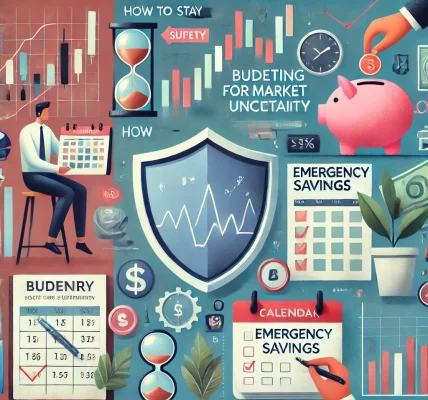Being a single parent can be both rewarding and challenging. With the responsibilities of raising children, managing household tasks, and maintaining a career, budgeting might feel overwhelming. However, effective budgeting is crucial to ensure financial stability and create a secure future for you and your children. The good news is that with the right strategies and mindset, it is possible to manage your finances and make it work as a single parent.
In this blog, we’ll explore practical budgeting tips for single parents, helping you manage your finances with confidence, stay within your means, and even invest in your future.
1. Create a Detailed Budget Plan
A clear and realistic budget is the foundation of any successful financial strategy. For single parents, this becomes even more essential since managing finances on one income requires careful planning.
- Track Your Income and Expenses: List all sources of income and every expense you have, from rent or mortgage to groceries, utilities, transportation, and child-related costs. This will give you a clear picture of where your money is going.
- Prioritize Essentials: Make sure your necessary expenses, such as housing, utilities, food, and childcare, are covered first. Once essentials are taken care of, allocate funds for other goals like savings or entertainment.
- Set Realistic Goals: Set short-term and long-term financial goals. For example, you might aim to save a set amount each month or reduce debt over time.
2. Cut Unnecessary Expenses
When you’re managing a budget on a single income, every penny counts. Cutting unnecessary expenses can free up more money for savings or investment.
- Evaluate Subscriptions and Memberships: Review all the subscriptions you have, from streaming services to gym memberships. Cancel any you don’t use regularly or can live without.
- Cook at Home: Dining out can quickly add up. Plan meals and cook at home, which is not only cheaper but also healthier.
- Buy in Bulk: Purchasing items in bulk, such as non-perishable goods and toiletries, can help reduce the cost per unit and stretch your budget further.
- Shop Smart: Look for sales, use coupons, and shop during seasonal discounts. Avoid impulse purchases by sticking to your shopping list.
3. Build an Emergency Fund
Life is unpredictable, and as a single parent, unexpected expenses can be especially stressful. Building an emergency fund is essential to help you weather financial storms.
- Start Small: Aim to save a small percentage of your income each month for emergencies, even if it’s just $25 or $50. Over time, it will add up.
- Make it Automatic: Set up automatic transfers to a savings account dedicated to emergencies. This way, you’ll be less likely to dip into it for non-emergencies.
- Use Windfalls Wisely: If you receive a tax refund, bonus, or any unexpected financial gift, consider putting a portion of it into your emergency fund.
4. Look for Additional Income Streams
As a single parent, your time may be limited, but there are opportunities to supplement your income without committing to a full-time second job.
- Freelancing: Use your skills and talents to offer freelance services. Websites like Upwork, Fiverr, or TaskRabbit can connect you to clients looking for work.
- Sell Unused Items: Declutter your home and sell items you no longer need. Platforms like eBay, Facebook Marketplace, or Poshmark are great places to sell gently used clothing, electronics, or furniture.
- Rent Out Space: If you have extra space in your home, consider renting out a room or parking space for additional income.
5. Maximize Tax Benefits
As a single parent, you may be eligible for tax breaks that can help lower your overall tax liability, freeing up more funds for your budget.
- Child Tax Credit: The Child Tax Credit can provide significant savings on your taxes. Make sure to claim it if you qualify.
- Dependent Care Credit: If you pay for childcare, you may be able to claim the Dependent Care Credit, which can help offset the costs.
- Earned Income Tax Credit (EITC): If you meet the income requirements, the EITC can provide a substantial refund that you can use to improve your financial situation.
6. Debt Management
Managing debt is crucial when you’re a single parent, as high-interest debt can quickly drain your finances. Here’s how to tackle it:
- Pay Off High-Interest Debt First: Prioritize paying off high-interest credit card debt, payday loans, or personal loans. The sooner you pay them off, the less interest you’ll pay in the long run.
- Consider Debt Consolidation: If you have multiple debts, consolidating them into a single loan with a lower interest rate can simplify payments and save you money.
- Avoid New Debt: Try to avoid taking on new debt unless it’s absolutely necessary. Live within your means and save for large purchases instead.
7. Plan for the Future: Save and Invest
While budgeting and saving are important in the short term, planning for the future is just as crucial. Start by setting aside money for long-term goals such as retirement or your children’s education.
- Open a Retirement Account: Consider contributing to a 401(k) or an IRA. If your employer offers a matching contribution, take full advantage of it. The earlier you start saving for retirement, the better.
- Education Savings Accounts: Look into 529 College Savings Plans or Custodial Accounts (UTMA/UGMA) to save for your child’s future education expenses.
- Start Small, Think Big: Even if you can only contribute a small amount each month, consistency is key. The power of compound interest means your savings can grow significantly over time.
8. Involve Your Children in Budgeting
Teaching your children about budgeting can be a valuable life lesson. Involving them in simple financial decisions will not only reduce their financial dependency as they grow older but also set them up for success.
- Set Up a Family Budget: Have regular discussions about finances. Show them how you prioritize spending and savings.
- Encourage Saving: Set up a savings jar or account for your children, teaching them the value of saving for things they want.
- Model Good Financial Habits: Lead by example and demonstrate how to budget, save, and avoid unnecessary debt.
Conclusion: Financial Success for Single Parents is Possible
Budgeting as a single parent might seem challenging, but with the right strategies, you can build a solid financial foundation. By creating a budget plan, cutting unnecessary expenses, saving for emergencies, looking for additional income, and planning for the future, you can stay on track and create a secure financial future for you and your children.




